Jeni must have a Dali-inspired bookcase, or something.
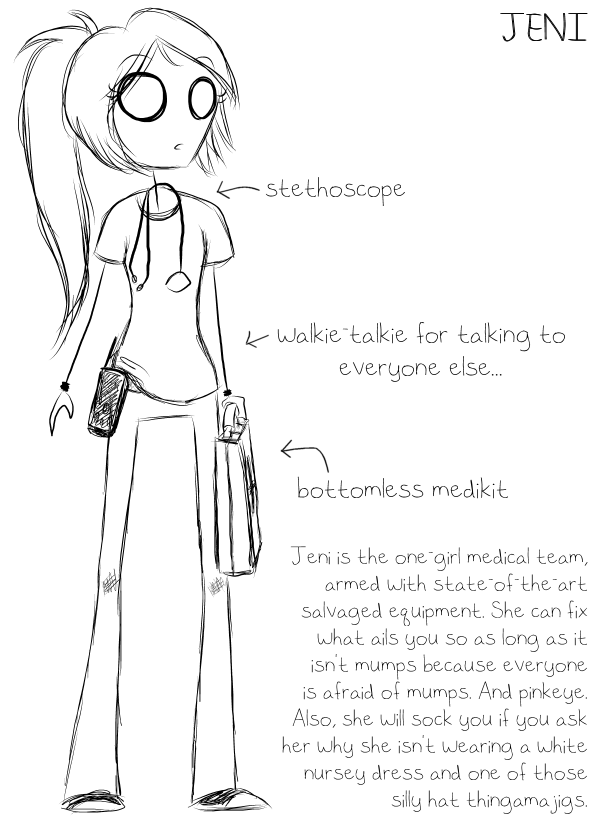
Articles by Jeni:
Welcome to my two day report! If you don’t frequent the forum then you might not know that I made an ImpishIdea t-shirt for going to the London Film and Comic Con at Earls Court last weekend (18th – 19th July). http://www.londonfilmandcomiccon.com
A lot of Twilight guests were going: Alex Meraz (Paul, werewolf, New Moon), Justin Chon (Eric Yorkie) and Peter Facinelli (Carlisle Cullen).
My t-shirt had the lovely slogan courtesy of SlyShy: “Twilight: Who needs a personality when you can sparkle?”
And on the back: “ImpishIdea.com Sometimes your story needs an edit. With a chainsaw.”
I’m a semi-veteran of these events, I must admit, been doing them since 2004, but finally, after so long, I felt excited about going again. So with my nice provocative clothing arriving just in time (long story), I set off Friday morning for Earls Court! London!
Part I
Well, I’m at LFCC. Currently I have abandoned my friends and sat down for an invigorating cup of tea. (Earl Grey. Hot.)1
How has it been thus far? Well, in the queue coming in I got, maybe, three dirty looks.
Especially from this one group of girls who I heard read out the slogan. Heh.
The sheer highlight thus far has to be a girl asking where I got my t-shirt. I MADE IT. So impromptu hugs for meeting my first fellow anti-Twilighter.
Although my best act has been to walk the entire length of the queue for the Twilight talk. I got looks. And then I turned around and walked back the opposite way to show the back of my t-shirt. YEAH. The scowls and clockwork ticking as they realised it wasn’t a compliment were all kinds of funny.
My mission, and want, is to get a picture with the Twilight cast. But I don’t want to fork out money, my friend is a PAing with Justin Chon, maybe I’ll hang around at the very end of the show, just as he’s leaving for the day and ask oh-so-casually.
Heh, yay, my awesome friend SAH…
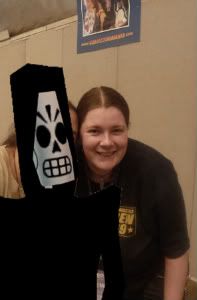
here she is.

Oh and this is us at Pizza Hut last night. LOOK AT THOSE PIZZAS. I didn’t want to go, but it was cheaper than the Mexican, dang democracy.

And here is Parliament! Aw, I feel like Nathaniel whenever I look at those buildings. :3
…is crewing. However, she has been asked by her friend to get some autographs for him. But, because she is crewing, she can’t take that much time out, so I’ve offered. Hurrah for meeting guests for free!
And in case you’re wondering, some of these photos have a ghostly air to them. This is what happens when I visit the Land of the Living.
I started off with a visit to Alexandra Moen (the Master’s wife from Doctor Who).
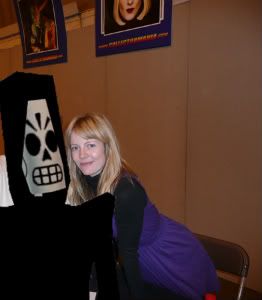
Aww, she’s so pretty and nice. Incidentally, I asked if she would be returning to Doctor Who and she said MAYBE in that way that means YES. :D
I then went next door and paid Danny John Jules a visit, as energetic and friendly as ever. He’s been to these events so many times, but he never disappoints
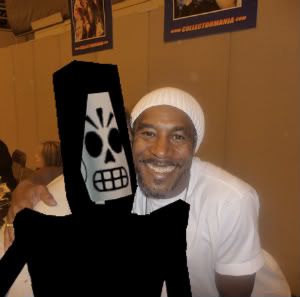
Isn’t he lovely?
Next was Hattie Hayridge, Holly from Red Dwarf.
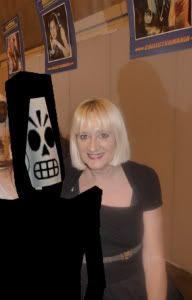
She was a delightful woman. I brushed over the fact I can’t remember much of Red Dwarf.
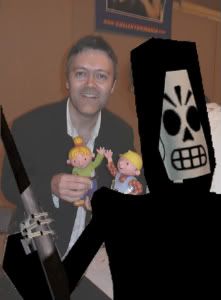
Paul Couvela, the animator for Bob the Builder, Pingu, Chuggington, and Life On Mars. Awesome guy. So talented.
Look! Wee Sam Tyler. ^^

I don’t know if many people have seen the url, it’s actually hard to tell.
Jake Lloyd has, well, despite having a permanent frown, did give my t-shirt a weird look and I had to explain. It could, though, be because the guy in front of me asked him if he would go back to Star Wars. His reply “I have no reason to…” was awkward at best. Oh, poor Jake Lloyd. Famed for one film that wasn’t terribly good. But don’t worry folks! I talked about alcohol to him, guaranteed to make any student jock grin.

Man, he looks so much like—I was going to say a friend from Uni, but then I remembered who could be his brother. An old friend from the Anti-Shurtugal days: TANAKA. :D
It’s actually surprising how many of my friends like Twilight, and they haven’t disowned me! Yay!
Oh, I don’t know, maybe I should have had a more provocative slogan? TWILIGHT: stalkers, paedophiles and sparkles.
Heh.
Part II
Another anti-Twilighter! Her t-shirt:
“…and then Buffy staked Edward. The End.”
:D
Part III
And another! Same slogan.
Part IV
Ah, finally it is over for the day! Sort of. I succeeded in getting a photo with Justin and Alex, thanks to some awesome bullying and peer pressure of my Twi-fan friend LAURA, known as MAJOR KENNEDY. PROPS YO.

Say hello to PKTechGirl! Dressed as Vala—she is a great cosplayer.
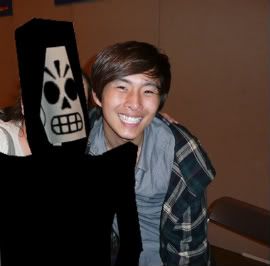
Incidentally, Justin Chon is the nicest guy I have ever met. He was just so terribly friendly, and his smile is absolutely gorgeous it makes me melt. I am thankful to Twilight for one thing: him.

Aw, look at Alex Meraz, so smexy. :3 He was also lovely— quieter, but lovely.
Neither commented on the t-shirt, whether they had time to read it or not, but I’m actually kind of relieved! That would have been awkward. Hoping to see Peter Facinelli tomorrow, he wasn’t here today “because of a passport issue”, how delightfully sinister.2
Currently waiting for my friend to officially finish crewing. Her guest, Jewel Staite, has buggered off for the day (she keeps disappearing…) but she can’t leave until the end. Bah.
Is it Scott Bak-u-la, or Scott Ba-koo-la? The former is better, because it rhymes with Dracula. But the latter is cool-a.
I think my friend is talking to Jewel’s husband, I’d go ask otherwise, Scott is right next door.
Best Things Overheard Today:
- “Get your lightsaber out of my neck.”
- “Don’t do that in England, you’ll get arrested.”
- “I’m not a racist, BUT.”
Worst:
- “Something’s wrong with this bacon, it’s taking too long to cook. I’m throwing it away.”
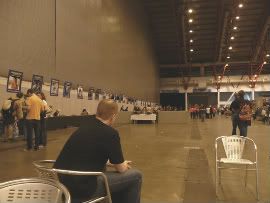

=
1 That guy that cosplays as Picard is here again. He looks JUST ENOUGH like Patrick Stewart to make me go “HUH?!”, and then, realisation DAMMIT.
2 Turns out he left his passport at home. XD
=
You can now read Sunday’s Report here
Comment [14]
Welcome to Sunday’s report. If you missed Saturday’s, it is here
It gets more exciting on Sunday, I meet some fabulous people, and possibly the most exciting anti-Twilighter.
Oh, and I meant to say in the Saturday Report, the reason why some of the photos are a bit ghostly looking, well, that’s what happens when I visit the Land of the Living.
Part I

Sunday! The second and last day. I’ve given up keeping count of dirty looks, but it is amusing to watch people’s eyes as they read and walk past me. Two great things about today: meeting another fellow anti-Twilighter in the YHA lounge—she liked my t-shirt :D—and meeting Gary Kurtz
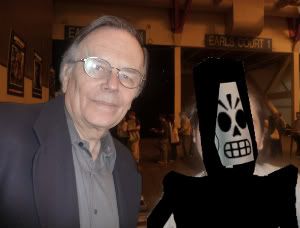
Excuse me, not even the awesomeness that was Gary Kurtz can distract myself from wanting to stab myself in the eye with this pen. Two people on the next table are talking about how awesome Twilight is and that it’s not a kid’s book! it has so much underlying stuff!
Gary Kurtz. He was awesome. And lovely. It’s only just started sinking in that I met the producer of Star Wars.
STAR WARS.
:]
I left a piece of paper on the artists’ table advertising ImpishIdea. I stole Kitty’s stalking picture. It was the only one that was simple enough for my pathetic skills.
NO. I can’t take it anymore. I MUST LEAVE.
Part II
OH. EM. GEE. I think I’ve just met the best anti-Twilighter ever…Jewel Staite’s husband.
Well, he didn’t commit, you couldn’t really, but commenting on my t-shirt? YEAH.
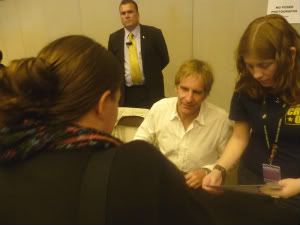
Heh, me and Sah got time to go see Scott Bakula together. He was such a charming man. So pleasant and friendly to the con-goers UNLIKE A CERTAIN SHATNER.
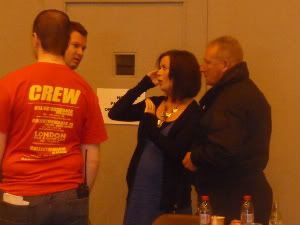
That’s Eve Myles, I normally hate taking pictures from a distance, talk about stalkerish, but, well, I was bored in the Michael Shanks queue.
You know who is also amazing? Hugh Quarshie! Aw man, he is one of those quintessential English actors. I love his work so much.
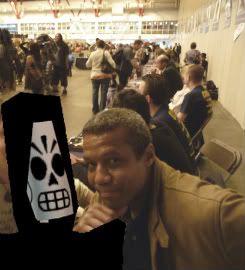
I finally bullied my friend Laura into getting Thomas Sangster’s autograph, so I had the perfect excuse to go up to him and talk and discuss Tintin and get a picture. He is just adorabubble. And he has big hair. Aw.
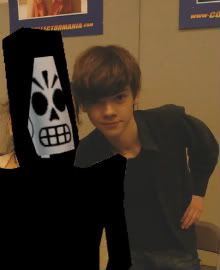
Part III
Well, it’s all over. Finally ran away just before 6pm. I was like “Are you guys leaving yet? No? In a minute? Ok…” Ten minutes later… “GUYS. SRS. Are we lea… oh never mind.”
Five minutes later:
“GUYS. I’m tired. I’m going home.”
Hugs for all, and then I got outta there and had to go back to the hostel because I left my backpack there. And then to the station. Fell asleep on the Tube, and woke up at one point to see “King’s Cross St. Pancras”
Crap on a crutch. My stop.
I leapt out of my seat, grabbed my bag and jumped off the train.
Walked up top, stopping to top up my NEW Oyster card (long story. Long, painful story. Involving Tube staff and an undercover policeman) with £10, so it’s nicely monefied for my next trip down.
Look at board. Oh, there’s a train at 6:15pm, what’s the time?
6:13pm.
Platform 8.
Next one at 6:52pm
RUUUUUUUUUUUUUUUUUUUUUN.
Part IV
I made the train. Just. Am now stuck at K____, because of signal problems. Oy.

When I’m not dressed in a black cloak, I wear jeans and trainers.
It got real bleak while I was stuck at E___ waiting for the next train. And then it started raining.

But never mind! because I had an awesome weekend. Best bits:
1. Going to the First Twinings Shop
2. Seeing Australia House
3. Being let out of the underground by an undercover policeman
4. Seeing Sean Maguire (oh why oh why did I not go say hello? >< He so pretty).
5. Meeting up with friends I haven’t seen for years
6. Seeing Moon, by Duncan Jones (one word review: excellent)
7. Waking up in the morning and getting confused about which country I was in (dang hostels)
8. Guessing, on Saturday, my friend’s secret Sunday cosplay (except he lied, the bastard :D)
9. Making way too many staff innuendo jokes (he’s holding his staff erect!) about a friend’s Tok’ra uniform
10. Eating red bean paste rolls
11. Meeting Thomas Sangster, Justin Chon and Paul Couvela
12. Jewel Staite’s husband
13. A cosplayer as Doctor Manhatten
14. Buying a TARDIS alarm clock
15. Watching Danny John Jules’ kids have a whale of a time running about
16. My friends LAURA and SAH.
17. Seeing someone with an xkcd “Science. It works, bitches.” t-shirt.
Thank you for putting up with the tales of my weekend antics. If anyone reading this saw me at the con, then please say something. I want to know whether the t-shirt was worth the expense.
Well, it was, because it’s a supercomfy t-shirt.
I just want to know if it did anything.
Comment [9]
Dear Christopher Paolini,
As Impish Idea celebrates its second birthday I wish to let you know how grateful I am to your books. I’m afraid they are badly written, no doubt about that, because of your poor prose, poor writing, poor characterisation, poor plots, poor imagination, poor— you know how if you say a word too many times it loses meaning? Poor.
However, despite all that and the ups and downs of the last four years (it seems longer), I still want to thank you. I have made some spectacular friends through meeting people who dislike your books. It’s funny. If you hadn’t watched Star Wars when you were younger, if you hadn’t met the stepson of Carl Hiaasen, if Knopf hadn’t seen something they could immediately abuse, if some of us hadn’t read the “finished” product, we wouldn’t be here today. I sometimes wonder how the last few years of my online life would have gone. To be honest, I probably wouldn’t have even gone to America IRL in 2008, I would have had no one to see. No one to visit. No one to eat dinner with them and their family. No one to follow around their high school. No one to visit a Mall of America with. No one to eat cinnabons with. No one to meet and laugh with at Twilight.
Food for thought.
(If you can’t tell, I like repeating certain phrases to emphasise my point, see how I draw attention to it, in order to excuse my amateur writing style. Now I can take refuge in irony. Too bad you can’t).
So Christopher Paolini, I would do a list of all the people that you have allowed me to get to know, but I’ll probably miss someone out, and then there will be many single tears and brooding and maybe some shaving while we stare at each others genitals.
…or maybe not.
In the end though, no matter how much I reveal about my life, it can never be expressed as well as, or as encompassing as those two simple words:
Thank you.
From the bottom of my heart.
Yours sincerely,
Jeni
Comment [27]
Hello, and welcome to a new series I’m planning on starting here at ImpishIdea, where I will write, hopefully regular, reviews of books that I am either reading, or have read previously.
It does take a lot to disappoint me (congrats Inheritance and Twilight), and I do generally enjoy looking on the bright side of a lot of books. Hence why I might review books higher than some, so please bear that in mind if you know your standards are higher. I read all kinds of genres: SF, fantasy, crime, action, mystery, historical etc. although there will probably be of a bias towards fantasy and SF, can’t change my roots, heh.
The rating system will be pretty standard, out of five stars, but because we are a literary themed website, it is far more appropriate to use books instead.
And so, to our first book…
Keeper by Mal Peet
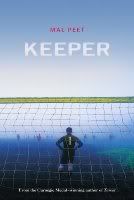
“I tell you this: you will do things that now seem impossible now only because you cannot imagine them. Because you do not believe in them. But you will do them, and afterward you will be amazed that you ever doubted yourself. Now, let me ask you that question. Which are you? Are you the jaguar or the deer?”
“The jaguar,” I said. What else could I say?
Without having first read Tamar (more on that later) also by Mal Peet, I don’t think I would have even considered reading this book. I am glad that I didn’t know what it was about before I got Keeper (and its sequel, The Penalty), because I don’t think even Peet’s name would have enticed me to read it. A book about football? The most interested I ever am about football is when Thierry Henry is around… drool during the European Championships and the World Cup, mostly because it is fun to cheer along with fellow Britainlanders. I know nothing about the finesse, or skill that football requires, and the offside rule is way, way, WAY beyond my ken.
In premise it sounds absolutely ridiculous: a ghost footballer from the jungle teaching an Ambiguous South American Country kid how to be a goalkeeper. I was very sceptical at first, and even now it makes me laugh, but I found it to be a pleasant read.
El Gato, a world famous keeper, has just secured the World Cup for his team. He is being interviewed by Paul Faustino, a veteran football reporter. Throughout the night of this exclusive interview, Gato tells Faustino his story.
Brought up in a village on the edge of the jungle, at 13 years old Gato soon quits playing football with the village boys, as he is gangly and clumsy. Whilst the boys play football, Gato takes to wandering in the forest and finds a clearing with a goal set up, meeting the ghostly Keeper. Taken under his wing, and through harsh training, Gato’s innate skill as a goalie is revealed and honed. Talented-spotted, Gato leaves for the city, and the national team, but he never forgets the Keeper and his secret.
Whilst not a great feat of literature, Keeper is enjoyable, even to those who have little interest in football. The writing is solid, akin to Anthony Horowitz’s style, it’s in too much of a rush to worry about purple prose. Yet this isn’t a bad thing, like Horowitz (and Applegate), the precise writing is enough to set the scene, and the story does run away with you. It is left up to the reader to really create and imagine the world in their heads. However, the writing does tend to favour the melodramatic, especially at the end of chapters. It’s like every chapter ends with someone standing behind you going DUN DUN DUUUUUN! Although this is great for soundbites, it does become a bit cynically tiresome after a while.
Although it is very much a tale of two characters (even then, the Keeper doesn’t get much of a look in), the characterisation is also solid, Gato is presented as the typical Arthurian knight: brave, true and honest, and above all, dedicated to his game. Yet, due to his initial constant self-doubt, Peet draws the reader in, wanting Gato to succeed and to realise his own talent; the classic underdog tale.
Although Keeper is quite obviously aimed at teenaged boys, it is nonetheless a story that will not disappoint the average reader. Whilst I wouldn’t exactly recommend you go out and buy it RIGHT NOW, if you’re stuck looking for a book at the library and want an easy read, you could do a whole lot worse.
Final rating: three out of five books

~
PS: Props go to my football-mad friend Craig for admonishing me about my football terminology in this review.
PPS: I may be football ignorant, but I do know that Thierry Henry can va va voom me anytime.
PPPS: Yes, this review was totally an excuse to watch that advert and say “va va voom”. Oh, he makes me smile.
Comment [29]
One Day in the Life of Ivan Denisovich by Aleksandr Solzhenitsyn
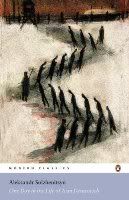
“How can you expect a man who’s warm to understand one who’s cold?”
~
“There was a short weight in every ration. The only point was how short. So every day you took a look to soothe your soul–today, maybe, they won’t have snitched any.”
Mmmmm, One Day. Possibly one of my most favourite novels ever. If you don’t know, Aleksandr Solzhenitsyn was a pretty important bloke. He was sent to the gulags (forced labour camps) for criticising Stalin in a private letter, and then later exiled to Kazakhstan. His book, One Day, an autobiographical account of his time in the gulags, exposed the horrors of Stalin’s regime to the Western world. He was awarded the Nobel Prize for Literature and is generally considered as one of Russia’s greatest modern writers.
One Day is what it says on the tin: it is an account of one day in the life of Ivan Denisovich Shukhov during his time imprisoned in a labour camp. From morning to evening, Solzhenitsyn introduces a range of characters, mainly from his work team 104th, that are all too human. During this one day, Shukhov initially feels ill, yet unable to stay in sickbay. At -31°C, Tiurin the team leader, successfully bribes the office workers to be sent to a building site with shelter and heating. Shukhov, as a mason, is dedicated to his work and becomes almost obsessed, in order to forget about the cold and the aches in his muscles. With a successful evening meal of two portions, and quality tobacco, Shukhov summarises the day, for the reader, as a “red-letter day”.
Solzhenitsyn presents Shukhov as an ordinary man in the camp: he is not the lowest of the low, but neither is he talented enough to rise in the prisoner hierarchy. Despite being a first person narrative, it is not written as one–the reader is only given access to Shukhov’s thoughts. This style of writing only enhances the novel, as it allows the reader to understand the thoughts going through Shukhov’s mind, but still remain detached: after all, with no pens and paper allowed in the camps, One Day is not a diary, and can never be conceived as one.
Perhaps what I enjoy most about this book is that it is not about the plot. In effect, there is no story, no grand beginning, no grand end. It is a slice of the middle part of someone’s life. Instead, Solzhenitsyn relies on the characters to bring the novel to life, and does so incredibly skilfully. The reader comes to care about Shukhov’s life, supporting him and wishing him to have a “good” day.
Through Shukhov, we come to understand other characters, and, despite being supporting characters, they have personality and history. Solzhenitsyn weaves these characters’ stories around this one day, so the reader becomes interested in the short history bites to find out what happened to these people and how they ended up at this gulag. Shukhov’s life is other prisoners. If Solzhenitsyn had chosen to focus on just one or two extra characters, the book, I think, would be poorer off for it. The other members of Shukhov’s team create (and are) his world. These characters show how people must change to survive in camps. And how sometimes they don’t.
Ultimately, though, as an autobiographical work, what hits you the most is that it is not a story. I’m not sure how I can emphasise this further, all the degrading torture, the conditions these prisoners go through, the food they eat, the desperation they feel, the loneliness, the backbreaking labour, the attempt to find hope where there is none, all of this happened. Solzhenitsyn doesn’t need to exaggerate certain details to make the story appealing to readers. This is why this book is special; it confronts the reader with the horrific part of human nature that exists in some.
The ending is suitably thought-provoking in an incredibly satisfyingly depressive way. Yep, sounds weirdly contradictive, but it’s not. It is so perfect for the tone of the book that the reader does not crave the answer of what happened to Shukhov. I was tempted to quote it here, but it is a line that would be out of place anywhere else, and the full emotive force would be lost, I believe.
I honestly cannot think of anything negative about this book, and even if I could, it would be nitpicking. One Day is one of those books that need to, and should, be read at least once in your life.
Even Unshelved agrees.
Rating: five out of five books

Next Week: The Ladies of Grace Adieu and other stories by Susanna Clarke
Comment [11]
The Ladies of Grace Adieu and other stories by Susanna Clarke
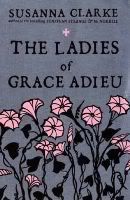
“I have it!” He was suddenly struck with a most original idea. “I will not quarrel with him! Then he will not kill me!” He looked down at the embroidery. “Oh, but he has such a conceited expression! Who could help but quarrel with such a ninny!”
Written by Clarke, the author of Jonathan Strange & Mr Norrell, this is a collection of fairytales, with some being set in the alternative world created by Clarke for JS&MN.
I must admit, when I first picked up the book (I got it for £1 from a book sale), I was hesitant. Whilst I enjoyed the inventiveness of JS&MN I found the story somewhat lacking and standard. The lack of a good plot contrasted with the creative language style.
My reservations were confirmed in the first story. It took me days to read it, simply because I could just not get involved. However, after leaving the world of JS&MN… well, I became absorbed. The storytelling was fabulous, the writing inventive, the characters believable (especially for the era they’re written in, you know, the one where people fall in love within a few days and women frequently marry men far older than themselves).
I think my favourite tale would have to be ‘The Duke of Wellington Misplaces His Horse’, in which The Duke of Wellington becomes lost in Faerie and attempts to plot the course of his future through a tapestry. It is deliciously funny, and perhaps my favourite line has to be the quotation at the beginning of this review. Clarke’s voice for the Duke is wonderful, and the ending has some wonderful political snark.
Another entertaining tale is the last: ‘John Uskglass and the Charcoal Burner’, which is rather surprising for me, as it was set in the JS&MN world. But it was a thoroughly entrancing tale of John Uskglass, the Raven King, meeting his match in a Charcoal Burner who would pray to saints and demand punishment to befall the Raven King. Again, Clarke’s wit is highlighted in this story, most notably in the saints’ reactions to the Charcoal Burner’s demands, especially for the last saint who has the barest of connections to Uskglass’ crime. The dialogue is practically swimming in sarcasm.
I think the best praise I can give this book is that it felt like a book of fairytales. For contrast, JK Rowling’s recent The Tales of Beedle the Bard were clumsy and unremarkable, her messages were clear and without subtlety. Fairytales are strange creations; their morals are obscure and debated.
This book had a distinctive fairytale feel to it; immersive and of a good length. Not too short, but not so long that you craved for a new chapter to take a breather. If you were a fan of JS&MN then this book is an obvious read, but, if you weren’t, I’d recommend reading it anyway. It is a lovely book full of mystery, suspense and morally dubious acts, and certainly not one I was expecting to enjoy so much.
Rating: four out of five books

PS: Yes, ok, technically it’s not 24th for me anymore, but I’m sure it’s 24th somewhere in the world. We can keep a secret, right? Right?
Next week: Tamar by Mal Peet.
Comment [8]
I did say Tamar this week, right? Well, even if I didn’t, I did. Got it? Got it?
Tamar by Mal Peet

When the wagon was almost upon him, and when he could almost feel the bullets tear into his chest, Dart raised his right forearm in a vaguely Nazi gesture. “Guten Morgen!” he cried, and when they were alongside he aimed his smile straight into the muzzles of the German rifles.
Oh boy, I love this book so much, and, as I said before, it is the sole reason why I read Keeper and The Penalty also by Peet.
Tamar is the story of a teenage girl, named after her grandfather, exploring his life after his death in 1995. Her grandfather was a member of the SOE (Special Operations Executive), a Dutch spy sent to Holland, along with another, to unite the resistance forces working there. Their codenames were Tamar and Dart, rivers in the South of England. They live in secrecy and lies, surrounded by suspicion and betrayal. Their work is sometimes horrifying, sometimes filled with boredom and punctuated with an absolute fear of getting caught and killed by Nazi soldiers, or worse.
However, in present day England, Tamar knows nothing of her grandfather Tamar’s past. She is left a box, for her to explore and work out the clues of his tangled web of a past.
Tamar is a book that needs to be read twice. But not straight away, a few months later when the more intricate details of the book have faded. So when it is read again, you pick up on the small things; the small asides that Peet cleverly includes early on in the novel.
I found this book conveyed such sheer emotive force to the reader. The characters are so realistic, that you become attached to them and their fates. Both primary and main characters have their own morals and own reasons for being a part of this Dutch resistance, rather than there for the story’s sake. The character development is poignantly written, as you learn more about Tamar and Dart and their lives.
The writing is just beautiful, Peet shows so much skill in describing the bleakness of the landscape that the two spies are faced with, and just what these two men have to do to survive. The story weaves in and out of the past and present, and when they merge in the finale, all the threads suddenly come into place, and Peet presents you with a rich tapestry of lives.
Tamar is sometimes funny, sometimes sad and sometimes truly horrifying, as only WWII novels can be. Like One Day, I have nothing negative to say about Tamar. It is an excellent book and I believe it should be read by everyone, which is why I would definitely support you going out to buy it RIGHT NOW.
Winner of a Carnegie Medal, Tamar has plenty of critical acclaim, I just wanted to give it some more. It is such a descriptive and absorbing novel, that I truly think no one can not enjoy it. But you have to read it twice.
Rating: five out of five books

(Why are you reading this? GO. BUY.)
~
Next week: Capacity by Theo Ellsworth
Comment [11]
Capacity by Theo Ellsworth
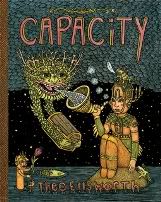
But as I walked by with my basket of choice edibles, I said to him under my breath: “That was a severely satisfying seven years, seven days, three minutes and forty-eight seconds, was it not?”
He did not look around. He did not say anything. He just stood there clutching a grapefruit to his chest, with an inhuman gleam in his eyes. The kind of gleam you don’t see too often anymore.
I walked over to juggle the beets.
Ah, already I deviate. I admit, Capacity is not a novel in the true sense of the word. It is a fantastical, graphical, autobiographical story of the artist, Theo Ellsworth, his projects and what has led him to this point in his life. So why have I chosen this to review? Well, Theo Ellsworth is a unique artist, I’m not even sure of his level of fame (but I do know he has 56 69 members in his Facebook fan group1), and whether anyone at ImpishIdea would have heard of him.
But I enjoyed his work so much, that I felt I had to share. If you want the short story behind it, in my travels of Amerika, I found myself in Portland, OR. At its famous market, I saw a stall with this guy drawing. The drawings on display drew me in, and picking up one of his books to read… ah, it was love at first sight. I coughed up the necessary money, and then, after sitting down to read them properly, promptly went back twenty minutes later to buy another one for my friend’s birthday. (The longer story involves my first encounter and tasting of ELEPHANT EARS. You Amerikaners know how to kill yourselves in the best way possible. Props, man.)
Capacity is a quirky, whimsical tale, and whilst not engaged in the actual plot, the book breaks off into short tangents of works that Ellsworth has previously published. (In fact, Capacity is a collection of works Ellsworth has drawn, and printed, thus far, with a story joining them together). I love his drawings, they are so intricate, you can sit there and want to look at everything in the whole-page sketches, but always find something new.
Surprisingly, the story is quite complicated, circular, and the reader has to remember details of what happened at the beginning to understand the end (or, else, re-read it). I’ll admit, the humour is… whimsical, quirky, eccentric, slightly odd, and probably not to everybody’s taste. But it is perfect for me. I guess one nitpick is that the story can drag a bit, I occasionally caught myself skim reading, but I still enjoyed it thoroughly.
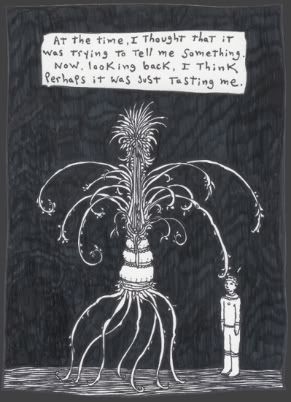
So if you are ever in the area of Portland, I definitely recommend you go down to the market and buy this book. Not only will you be supporting an emerging artist (as long as you are sure the humour is of your taste), the Imaginary Body Club will welcome you and your tea will always be blessed by an authentic tea gnome.
Rating: four out of five books

Next week: The Raw Shark Texts by Steven Hall
~
1 It’s gone up since I wrote this review! Excellent!
All pictures used without with permission of Theo Ellsworth, visit his site for more at http://www.artcapacity.com/
Edit 1: Capacity and others are available to buy at the Secret Acres shop (e-mail for international postage). I recently added Sleeper Car to my collection = fabulicious.
Edit 2: With future readings, and tweakings, and having too much time to think whilst driving (heaven forbid I should pay attention to the road and the guy WHO CUT ME UP ON THE ROUNDABOUT TODAY F^*%!), it’s occured to me that I have approached this review in a very superficial manner. I concentrated on the humorous aspect of the story, but ignored what made it a poignant and personal piece. Ellsworth shares with the reader some of his lowest moments as an artist, his drawings and stories evoke an sympathetic bond between him and the reader.
At times the story can have depressive shades, and it makes the book a much bigger journey. However, despite this, one still comes away with humour and hope being the main messages of the book. Which is probably why I initially focused on the quirky humour.
But you know what? If you want to go all the way around the roundabout, experts agree the RIGHT INNER LANE IS THE ONE TO BE IN.
Comment [10]
The Raw Shark Texts by Steven Hall
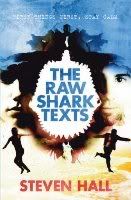
“I was unconscious. I’d stopped breathing.
I don’t know how long it lasted, but the engines and drivers that keep the human machine functioning at a mechanical level must have trip-switched, responding to the stillness with a general systems panic. Autopilot failure – switch to emergency manual override.
This is how my life started, my second life.”
When I first picked up The Raw Shark Texts (wordplay on Rorschach test), I read the whole book in nearly one sitting. Ok, granted, if you want the longer story, I was on the island of Aitutaki in the middle of the Pacific Ocean, on my own in the whole accommodation and it was raining. No TV, no radio, no computer, no internet, just me, the rain and a few geckos for company. And a shelf full of half a dozen books.
Paradise.
The story is of Eric Sanderson, a man who is suffering from severe amnesia. He remembers nothing of who he is, where he is, or the house he has awoken in. All he has are letters claiming to be from who he was before and explaining the death of his girlfriend, Clio, which led to his present state. However, Eric is in danger, he has been targeted by a Ludovician, a conceptual shark, swimming in the sea of knowledge, which feeds off memories. The letters, although they show Eric how to protect himself, lead him into a murky world of the mind and the abstract. Where he attempts to discover how far Eric Sanderson was willing to go to bring back Clio.
The Raw Shark Texts is, well, it’s a strange novel, certainly ambitious, clever and incredibly immersive. But it’s still a very strange novel. The concepts that Hall encourages you to envision are, well, I think the most helpful thing I can do is compare it to Gaarder’s Sophie’s World (although obviously without the heavy introductions into philosophy). You are never quite sure whether Hall is telling you to take everything literally, and that these mental fish are real, or whether they are indicative of Eric’s state of mind. And just to confuse things, the ending refuses to confirm nor deny any suspicions you may have either way.
But that didn’t bother me, I enjoy stories where the author encourages the reader to leave with their own interpretation in their head. I feel it creates a richer experience and a more immersive story (like Choose Your Own Adventure! but less lame). The plot was easy to follow, as I said, your interpretation may differ from mine (hence, Rorschach test), but that doesn’t detract from what happens in the novel.
I found the characters to be realistic, especially when Hall even appears to partake in some meta-writing: “Stories are all we’re ever left with in our head or on paper: clever narratives put together from selected facts, legends, well edited tall stories with us in the starring roles. I’ve read the journal so many times now the lines are all wooden and obvious, as unrealistic as a daytime soap or a famous Hollywood movie you’ve seen a thousand times.” It’s just so indicative of characters that always have a witticism on hand, despite enjoying it, something the film Juno is guilty of. Hall does indulge in it himself, but that quotation makes up for it.
The writing was light and fun, not too purple, but nor is it sloppily written. Hall can enjoy the infodumping, but, seeing as the main character has lost his memory, it makes sense within the story and flows well. At no point did I feel overwhelmed with new information, Hall ensures that it is spread out over the course of the novel, and given at points where you crave to find out just exactly what The Backstory is.
Perhaps what I enjoyed most about the story is the cat. Whoops, short reverse there. Eric Sanderson has a cat. Not a dog who follows him faithfully, but a cat who he has affection for, and has to look after. A cat whom he has to lug about in a cat carrier so he doesn’t run off, feed and actually toilet. Not only does this give me a warm fuzzy feeling (yay cats), but, well, it’s different, isn’t it? I found it more indicative that Eric Sanderson used to have a real life with responsibilities, and that just doesn’t evaporate because the Story Demands It.
Plus, kitties.
The likelihood I’d read this book again? Definitely. I enjoyed it, it was light reading, but not so light to be brain candy. Enjoyable, interesting and contemplatively different and away from the norm. I’d definitely encourage everyone, if not to buy, then certainly get out of the library and read.
Rating: four out of five books

~
Next time: A Scanner Darkly by Philip K. Dick, no promises on when, I’m afraid, as I’m packing up to go back to university.
Comment [7]
A Scanner Darkly by Philip K. Dick
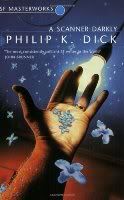
Robert Arctor halted. Stared at them, at the straights in their fat suits, their fat ties, their fat shoes, and he thought, Substance D can’t destroy their brains; they have none.
Maybe I have a thing for drug-induced stream of consciousness novels.
Anyway, as I’m sure everyone remembers, this novel by acclaimed SF writer Philip K. Dick was fairly recently released as a film starring Keanu Reeves (2006). The film (although I never got to see it, the concept still intrigued me) brought my attention to the book. So when I saw my brother reading it last year, I asked to borrow it. Instead he got it for me for Christmas. Yayshum.
The story is about a new drug, Substance D, or Death. The main character, Bob Arctor, is an undercover cop. His job is to stand as a Substance D user and attempt to climb the dealer hierarchy and find out the source of the drug. However, to pass as an addict, he must become a user.
Although classified as part of the SF genre, I would say this story is anything but. Sure, it has fancy, futuristic technologies (well, fancy and futuristic back in 1977) but those are merely the vehicles for delivering the main message to the reader: what drugs do to you.
A semi-autobiographical work, A Scanner Darkly intimately shows the reader the effects of mind-altering drugs. It’s not merely the highs and lows that the characters go through, but their fragile mental state. The delusions, the paranoia. Dick absorbs you into that mode of thinking; as the reader you constantly question not only Arctor’s housemates and friends, but the “good guys” too. No one in this world can be trusted, and Dick follows this theme through beautifully. He doesn’t launch the reader into it; instead the novel follows Arctor’s decreasing mental state.
Perhaps what I enjoy most about this novel is that although you, as the reader, may empathise with Arctor’s situation, Dick makes it clear that these have all been choices that Arctor has made: “Drug misuse is not a disease, it is a decision, like the decision to step out in front of a moving car.” But, and this is what makes it special, with no moral judgement, it is truly about the consequences of decisions that these people have made. They tried to enjoy life and face the consequences of it.
The only thing I might warn potential readers about is the stream of consciousness form of writing. It can be hard to get a grip on and sometimes you read one paragraph and go “uh, what just happened?” But that is the tone of the novel, and it would suffer without it.
However, behind all this drug use, there is a story here, and the ending is depressingly perfect.
Rating: four out of five books
Comment [7]
Short Story Edition I
This week I thought I’d try something new. I’ve been on an old SF kick lately, so I’ve been reading a lot of Philip K. Dick (it all started with A Scanner Darkly) well, actually I’ve been reading Star Wars braincandy, but I want to sound distinguished. But, instead of giving you titles to suggest you go out and buy, I’m going to read and review short stories of his that you can read online for free (or on an e-book reader if you’re cool enough to have one). Then, we can have a semi-discussion in the comments. Sound good?
I probably won’t do ratings for the individual short stories only because I have a low tolerance threshold when it comes to short stories. I either read and enjoy them (and thus they are Good), or don’t enjoy them and give up (thus they are Not Good). So never fear! these are all Good.
Beyond Lies the Wub by Philip K. Dick

The slovenly wub might well have said: Many men talk like philosophers and live like fools.
~
July, 1952.
When I initially set to writing this review all I could think to type was (in order of expression):
D:
T_T
O_o
Which pretty much sums it up. However, if you want a bit more detail, the story is about a group of astronauts leaving Mars to return to Earth. One of the crew members brings along a wub, which he bought from a Mars native (1952, remember). However, it soon becomes apparent that the wub is more than a Martian pig.
Clocking in at a mere 2,648 words, Beyond Lies the Wub will not take long to read, and it’s worth it. Dick isn’t putting forth an ideal version of the future, the captain is horribly unlikeable, and yet, there is some question as to whether he is the real villain of the piece. He is, but his dark side is somewhat crude, more human, more animalistic.
I don’t think the ending was just, but Dick doesn’t force you to come to a conclusion either way. So when (not if) you read it, come back and tell me what you thought.
Comment [17]
The Slave
by Isaac Bashevis Singer
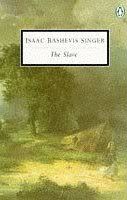
Jacob felt a stab in his heart every time he saw the past visibily resurrected. No doubt the living must go on living, but this very affirmation betrayed the dead. A song he had heard a wedding jester sing same to his mind: “What is life but a dance across graves?”
Sometimes chance brings us some of the most beautiful things in life. I picked up this novel on a whim, browsing the Classics shelf at the local charity shop it caught my eye. At £1.49 I thought it was worth a chance and decided to give it a go. I am so relieved that I did, because I now can’t imagine not having read this novel.
The Slave (originally written in Yiddish, it was translated into English under the supervision of Isaac Singer) is the story of Jacob, an educated Jew from Josefov, Poland. Set in 17th century, after the massacre of his town he is sold to a farmer in the mountains. There Jacob finds love, but faces a continual struggle to reconcile his faith with the massacre of his people.
Singer, apparently, considers a beginning, middle and end to be an intrinsic part of any story. This novel certainly follows the formula, following Jacob throughout his life. Specifically, his new life. Following witnessing such a massacre and then exile in the mountains, Jacob is a changed man. For Singer, it is not important that the writer experiences Jacob pre-massacre. Although we are given glimpses into his past life, Singer makes it clear that the horrors Jacob has seen has effectively been his death and rebirth.
This formula makes it wonderfully easy for the reader to connect with and become attached to Jacob. He is sort of man that you find it hard to dislike; humble, learned, disapproving of those with loose morals, but non-judgemental, aware that he too has sinned in his life. Twice, at 3am or so, I was sobbing my eyes out and couldn’t put the book down because I needed to know what happened to him.
The writing style is enjoyably flowing. Easy, but not simple. It is perfect for immersing the reader into the story.
I think what I enjoyed most about this book is the discussions Jacob has with himself and others about his faith. It is clear that at times he truly questions some key aspects. One could think that the novel is preachy, and is a self-insert of the author’s own religious beliefs. However, it is not. The reader gets the genuine feeling that Jacob is reacting to what he has experienced and what he feels in his heart. It’s terribly engaging and at times frustrating, because his faith separates him from what could be a happy life.
If one wanted to nitpick, it could be that the ending is over-sentimental, but I don’t care. By that point I was so attached to Jacob and Sarah that I was in floods of tears.
Four point five out of five.
~
Happy New Year, everyone. :)
Comment [5]
On the Road
by Jack Kerouac

“Our battered suitcases were piled on the sidewalk again; we had longer ways to go. But no matter, the road is life.”
Another one of my favourite novels! Starting my first itchy feet, this book was a big factor in making me want to travel. It is a pure hedonistic whirlwind, rollercoaster of a ride back and forth across Beat America. Which is the child-friendly way of describing On the Road without mentioning the sex, drugs and out-of-this-world crazy. The most popular story about the novel was that Kerouac wrote it solidly during a three week haze of drugs and drink, which is pretty indicative of the kind of novel it is.
An autobiographical work, the novel follows Kerouac’s (Sal Paradise) journeys around America, often in orbit of Neal Cassady (Dean Moriaty). It begins with Sal as a young man, full of hope and excitement, ready to take and accept any situation that comes his way in his journey across America. Entranced with Dean and his wild energy, Sal follows him, wanting to live that same out of control lifestyle and to ultimately break free. Their friendship evolves throughout the novel, but for the most part, out of all the crazy friends they have, they remain travelling companions.
Even after reading On the Road so many times, it still grabs me and entices me to grab a bag and hit the road in a way that is impossible to ignore. To be free, to do what you want, when you want, with little responsibility. I think, a romanticised lifestyle that a lot of people would yearn for, whether or not they could actually do it. Or even undertake it in the way that Sal, Dean and their friends do.
Although Kerouac is Sal, and Sal is the narrator, the star of the story is Dean.
I’ve always seen the novel as a journey in itself, the enthusiasm fluctuates with Sal’s mood. This is far more apparent at the end of the novel, as I find it harder to keep reading as I did in the beginning. The sheer energy wears you out.
Perhaps all the people in the novel seem exaggerated and unbelievable, it doesn’t quite seem real that they could and would act and react in the ways that they do. It’s hard to get attached to them as you would a ordinary novel, the unpredictability and loose morals can be confusing and almost seem to belong to a world that the ordinary reader doesn’t belong to.
Yet that is perhaps what is most enticing about it. To think that yes! I could belong to this crazy life that would enjoy and live life to the fullest! but not face the consequences. The novel allows such a reader a line into that life, convincing them that anyone could do it.
This is possibly one of the hardest reviews I’ve written. Although I love this novel and have read it almost a dozen times, I find it difficult to describe or argue its brilliance. I have seen some people describe it as overrated, and certainly, it might not be to everyone’s taste.
But it is worth reading at least once, it might change your life.
Four point nine out of five.
~
I totally did it for the url.
Comment [6]
Jimmy Coates: Killer
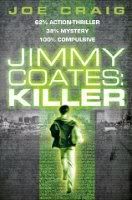 v.
v. 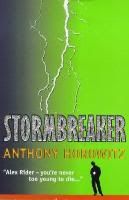
NOTE: Read The Abstract Bookcase: Jimmy Coates: Killer first. That’ll explain this sordid review, it’s the crazy uncle at the party that people try to avoid. And it doesn’t have nearly enough skittles, unicorns and rainbows, what’s up with that?
SECOND NOTE: if you were linked to this review, welcome to II! I hope you enjoy this and stick around. We’re all lovely folks that adore our reading and writing, and would love to have you on the forum — come say hi!
~
I am hesitant to compare Jimmy Coates: Killer with Alex Rider (I believe books and authors should stand on their own feet; just because Book X is better than Book Y does not make Book X a good book) as I think Joe Craig is a talented author in his own right.
However, in such a spy/action genre, there are so many others fighting in the same field. In a way though, these comparisons can actually highlight the triumphs of Jimmy Coates.
That and this is a good place for me to vent.
I’m going to restrict my comparison to Alex Rider because that is what so often gets mentioned, and because it’s the one series I know best.
It is, in a sense, the inevitable comparison. Both books feature young male superspy protagonists. The difference is, on his way to the moon, Alex Rider took a detour on a motorcycle down a ramp and over a tank of a well known shark. Horowitz (until Crocodile Tears I must note — excellent book that redeemed my faith in the series) seems to have this odd need to justify everything that Alex does and how it is plausible and possible.
Whilst I sort of appreciate that Horowitz isn’t treating his audience like children, it is also incredibly jarring in terms of Alex being anywhere close to the audience surrogate. Kids, I’m sorry to ruin life for you, but you aren’t going to end up in space and survive.
By trying to make it realistic, Horowitz sacrifices realism.
Craig, on the other hand, has created an absolutely ridiculous scenario, justifying it as being “future technology” and gets on with the immensely fun story. And that’s what truly matters in Jimmy Coates, with books aimed at a certain age range, sometimes all you want to do is enjoy the action.
And they are just as enjoyable as Alex Rider. They are not clones, they stand on their own feet. So if you enjoy Alex Rider it is definitely worth giving these books a try.
Comment [3]
Jimmy Coates: Killer

“He coiled his body into a ball and shut his eyes tight. The two men were stunned as Jimmy smashed through the window. Glass shattered everywhere and Jimmy felt it falling with him. The air was suddenly cold. He screwed his eyes shut harder and waited to hit the ground.”
~
NOTE: if you were linked to this review, welcome to II! I hope you enjoy this and stick around. We’re all lovely folks that adore our reading and writing, and would love to have you on the forum — come say hi!
~
Jimmy Coates: Killer is set in the unspecified, but not far off, future of Britain. At 11 years old, Jimmy Coates discovers that he has been grown, genetically modified, to be the perfect assassin. He is only 38% human. Faced with a unsavoury future, Jimmy rebels against the path laid out for him, but who can he trust?
At first glance, this is your average spy thriller novel, and to some degree, it fulfills all the tropes. Witticisms, action, adventure, conspiracies, twists, everything that a spy action thriller should have is present in this book.
Yet somehow, it subverts some of these.
By making Jimmy Coates 11 years old, it presents an actually interesting scenario: for one thing, Jimmy is not some know-it-all teenager. He is distinctly a child, and although he tries to be brave, acts appropriately. Craig picks up on this in one scene that is hilarious for the older reader, and really indicates that two of the main characters are so young. Not only is it funny, but it does show that Craig has not given the main character an arbitrary age and just got on with the story. For those moments where Jimmy can’t be 11, a thoroughly good explanation is given.
And that leads me to my next point: yes, the plot is absolutely ridiculous, but that, surprisingly, does not matter. Craig gives you the wobbly justification for the plot and then grabs you by the hand and pulls you through this exciting world full of skittles, rainbows and unicorns with guns. And he does it so seamlessly, you don’t stop to question how the unicorns can fire guns when they only have hooves.
Because that’s the thing: you don’t need to question. This book is one of the many personifications of Fun.
Still, when you’re skipping over the rainbow bridges, you do suddenly realise that they’re not all Richard Of York Gave Battle In Vain. The political environment that Craig creates is thoroughly intriguing, and in a way, far more subtly terrifying than 1984 could ever be.
The writing is smart, tight and not at all purple, which is unsurprising given its target age group, but it is worth mentioning.
I’d suggest buying it, but I know that it was never really released in the US, so have a look in your library if you just want a break from reading War and Peace.
Personal highlight: a character called Saffron Walden.
Saffron. Walden.
How British can you get?
~
DISCLAIMER: book range is 8-12 year olds. I don’t care.
I have written two reviews for Jimmy Coates: Killer. This review is my preference, I like to judge a book on its own merits. The second, however, is more of a comparative review with other similar novels (notably Alex Rider), which everyone seems to mention at least once in reviews.
Comment [13]
